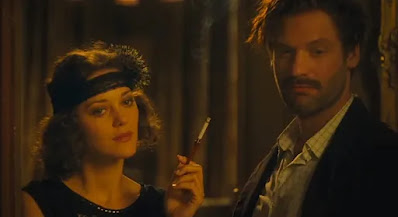There are apparently two major industries in Britain that have created rabid fans: football and Peter Morgan-Michael Sheen movies. Football we know all about. What we colonists call "soccer" is an obsession carried in the hearts and minds and livers throughout the entire rest of the world (as a matter of fact, you could probably make a connection between loving this injury-inducing sport and embracing universal health-care!).
The team of Morgan and Sheen, which started with "The Deal" and The Queen, continued with the play and film Frost/Nixon (and will continue with Sheen again playing Tony Blair in Clint Eastwood's forthcoming Hereafter*), here takes on the insular world of FC football and the storied career of Brian Clough, who took the second division Derby County Club into the first division and then the championship, and in a fit of hubris, took on the management of Leeds Utd, the club of his arch-rival Coach Don Rievie and was fired after 44 days. Here, though, the focus is not on the playing field, but the kicking and gouging going on in the mind of Clough.The feats Clough accomplished were done with aplomb, ego, a big mouth and a vindictive drive to show up the other teams in the leagues, especially Leeds. But, that drive also gave him a tunnel vision when it came time to manage Leeds, which was done with a "new broom" approach, angering the players, the club's board and the fans who saw the team fall to its worst season in ten years after only six games. Consequently, he got the sack. As fast as his success was acquired, he fell ten times faster.Morgan as screenwriter lets the mighty fall gently, depending on the grace that is shown, and whether the eyes are open during the trip. Idi Amin and Nixon, locked in their delusions, get no sympathy. Queen Elizabeth and Tony Blair are allowed insight as they're falling. Clough gets that insight after he hits rock-bottom, and Morgan's frequent collaborator Sheen registers every triumph in flashing teeth and every hurt in darkening bags under his eyes. Sheen, as a performer who's made a living playing performers, knows the degrees to which the face can display a false-front and genuine pain. During an introductory press interview before taking over for Rievey, it's a cocky Clough who, with no prior knowledge, already thinks he has the team licked, with secret winks, flashing tongue and a smarmy way of laughing at his own jokes. After a dressing down from the Leeds captain, he'll maintain the same confident smirk on his face, but his eyes will dull with fear as soon as the player turns his back. If Sheen felt any disappointment in not playing the "Nixon" part of Frost/Nixon, he's compensated here for playing a personality of similar insecurities, but with an antic theatricality that the former President was never capable of. It's Sheen's show, but he's given ample opposition and support from Timothy Spall, Jim Broadbent, and Colm Meaney, who plays Coach Rievie with an irascible sense of entitlement.Director Tom Hooper keeps things low-key in a BBC vid kind of way (thankfully dropping the peculiar framing that marked "John Adams"), but it isn't too long before one notices that, more and more, he's placing his Clough in ever tightening offices, hotel rooms, and locker-room corridors—an outsider trapped in his own prison of obsession and focus. One sequence is brilliantly twisted in its scope, or lack of it: as a much-needed match goes on outside, Clough stews and twitches inside his dennish office behind the stands, listening to the crowd reactions, not daring to emerge into the light to watch. Perversely, whenever a Derby goal is scored, the crowd leaps to its feet blocking out the only outside light to his office, casting him in darkness. You know that whatever Clough wins, he's lost.

































